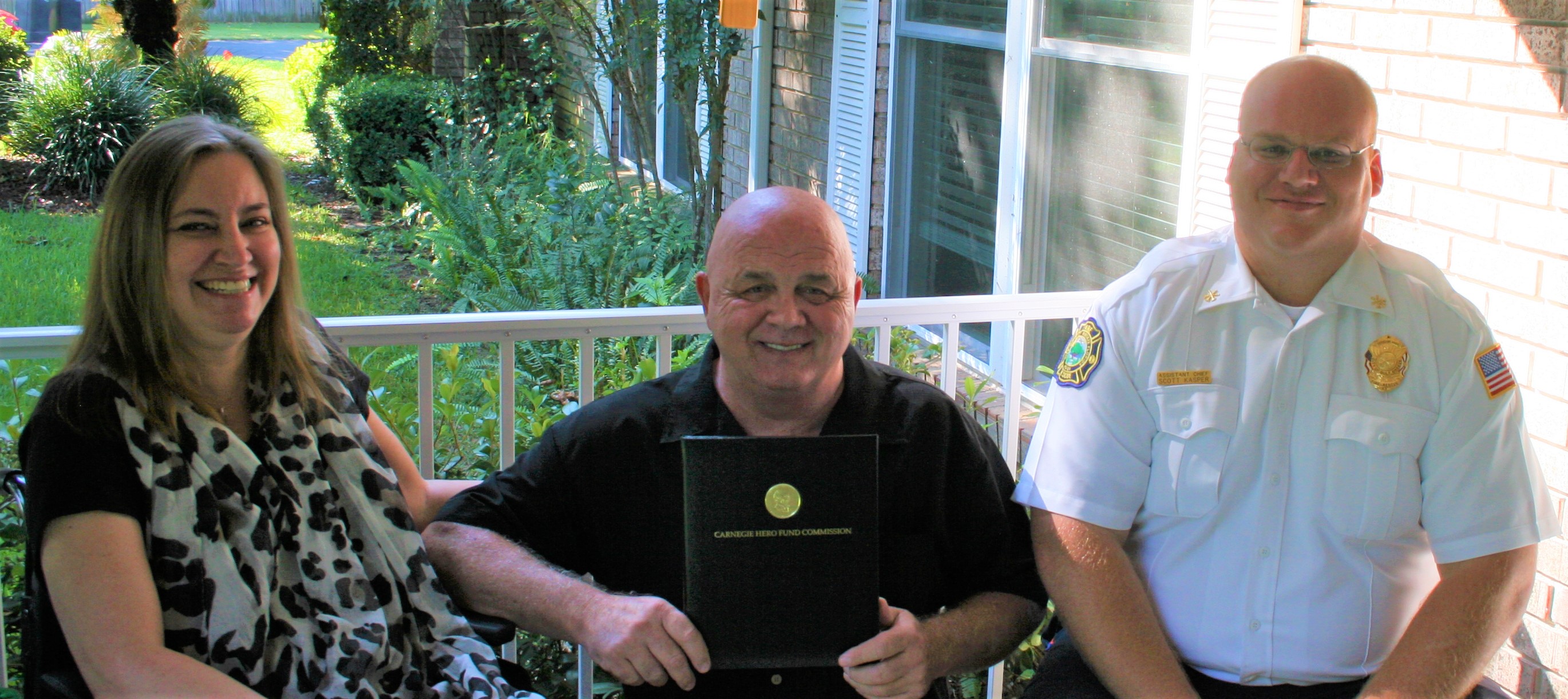
Pictured are Wright, Hammond and City of Gulf Breeze Assistant Fire Chief Scott Kasper
The Carnegie Hero Fund Commission on Tuesday awarded 18 civilians for “acts of extraordinary heroism,” and David E. Hammond of Gulf Breeze was one of the recipients.
Hammond is credited with saving a friend and tenant, Stephanie Wright, from burning inside a Gulf Breeze home on July 28, 2016.
City of Gulf Breeze Assistant Fire Chief Scott Kasper, who responded to the scene that night, said there is “no doubt” Wright would have probably died within three to five minutes if Hammond had not taken heroic action.
Wright, 47, who suffers from MS and uses a wheelchair, was in her bedroom when a fire believed to have been caused by the charging of an electronic hover board started in another bedroom on the same end of her one-story house. “My animals were on the end of my bed, and I saw a fire in my son’s room,” she said.
Wright called 9-1-1 and spoke with a dispatcher. “Hurry up!” she can be heard saying on an audio recording of the conversation. She said dark smoke was entering her room, it was getting “very hot” and she was having to use a pillow to cover her mouth to talk to the dispatcher, who told her everyone needed to get out of the house. “I’m handicapped,” she stated.
Wright used another phone to call, Hammond, 64, retired business operator.
Hammond said after he heard her say “I can’t breath, I can’t breath” he rushed to the scene, thinking she was entangled in medical equipment but instead seeing a “giant flame shooting up” from the home.
According to Kasper, Hammond arrived just in time. “It was a rapid fire growth when we arrived he said.” And first responders did not know Wright’s exact location in the house.
“Without Mr. Hammond I do believe Stephanie would have perished. He definitely took a significant risk to his own well-being,” Kasper said.
Hammond not only immediately ran directly to her exterior bedroom door but also used his shoulder to crash through a sliding glass door.
The crashing can be heard on the audio of Wright’s 9-1-1 call. Wright has passed out by that time.
Unable to see her in the bed, Hammond crawled until he felt it and located Wright, dragging her to the door. Hammond then collapsed.
“It’s not easy for an everyday person to get through choking smoke,” Kasper said, pointing out that firefighters have special protective gear to aid them.
Police officers took Wright away from the house as firefighters arrived on scene. “I woke up in my neighbor’s (yard),” Wright said.
Thankfully Wright was not burned but was hospitalized two nights for treatment of smoke inhalation. Sadly, her cat Ellie and dog Chloe perished in the fire despite attempts to save them.
Hammond suffered numerous cuts on his body and was also treated for inhaling smoke. He still has shards of glass in his body from the incident.
“I don’t really think I deserve (the award),” Hammond said.
But Wright disagrees. “I think he deserves it,” she said, adding, “My son, Harrison, was excited about it because he wouldn’t have a mom today.”
The Carnegie Medal is given throughout the United States and Canada to those who risk their lives to an extraordinary degree while saving or attempting to save the lives of others. The heroes announced today bring to 57 the number of awards made to date in 2017 and to 9,971 the total number since the Pittsburgh-based fund’s inception in 1904.
Commission Chair Mark Laskow said each of the awardees or their survivors will also receive a financial grant. Throughout the 113 years since the Fund was established by industrialist-philanthropist Andrew Carnegie, $39.4 million has been given in one-time grants, scholarship aid, death benefits, and continuing assistance.
































